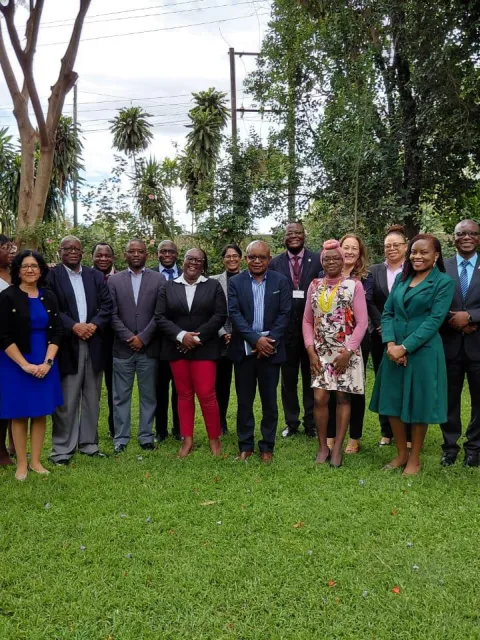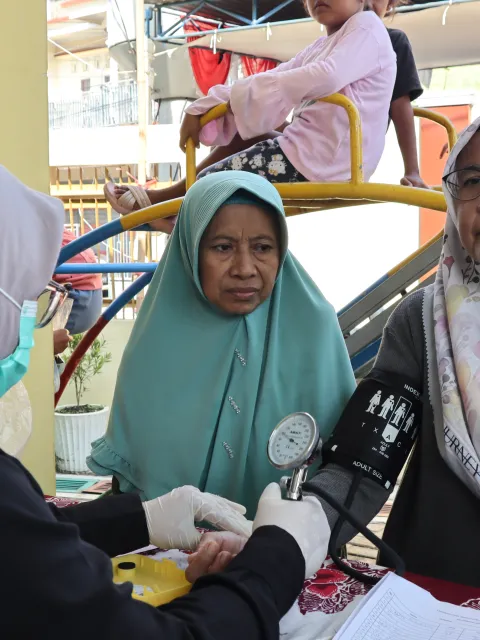ATOM Coalition marks second anniversary with key commitments
The UICC led Access to Oncology Medicines (ATOM) Coalition has made significant strides in expanding access to essential cancer medicines in low- and lower middle-income countries (LLMICs).

Dr Ronald Alfonso Pérez Escobar, from the Ministry of Health of El Salvador, speaking at a reception of the Access to Oncology Medicines (ATOM) Coalition held at the offices of UICC on Tuesday 28 May during the World Health Assembly. El Salvador is one of the countries where the ATOM Coalition is prioritising its efforts to help ensure that the right cancer medicines reach the right patients at the right time.
HIGHLIGHTS
- Bristol Myers Squibb (BMS) will work to broaden the reach of their innovative immuno-oncology therapy nivolumab to patients in select LLMICs, with plans to expand to additional countries by 2025-2026 and beyond.
- The ATOM Coalition, in collaboration with IDA Foundation, has introduced new access pathways such as NCDconnect and indirect commercialisation to enhance the availability of essential cancer medicines in LLMICs.
- The IDA Foundation has already made 70 cancer medicines on the WHO Essential Medicines List available through NCDconnect and will soon add 14 cancer diagnostics.
- UICC recently signed on behalf of the ATOM Coalition a Memorandum of Understanding with the Mongolian Ministry of Health. Similar engagements are underway with El Salvador and Zambia.
The ATOM Coalition has seen key achievements in the two years since its launch in May 2022 and acknowledged them at a reception at UICC’s offices this week. Partners and other invited guests celebrated significant milestones and the fruitful collaborations fostering increased access to essential cancer medicines in low- and lower middle-income countries (LLMICs).
Examples are the recent announcement of Bristol Myers Squibb (BMS), in its strategic collaboration with the ATOM Coalition, to broaden the reach of their innovative immuno-oncology therapy nivolumab to patients in select LLMICs, with plans to extend access to additional countries by 2025-2026 and beyond.
The medicine is used to treat cancers such as non-small cell lung cancer, gastric/oesophageal cancer, and certain types of advanced colorectal cancer. It will be made available via indirect commercialisation, one of the ATOM Coalition access pathways.
Target nations will initially include Pakistan, Rwanda, and Zambia, aligning with the ATOM Coalition’s mission to enhance the availability of life-saving cancer treatments in a scalable and sustainable manner.
In collaboration with partners, the ATOM Coalition focuses on four medicines access pathways:
- Licensing (with Medicines Patent Pool)
- Humanitarian access (with The Max Foundation)
- NCDconnect (an innovative platform run by IDA Foundation)
- Indirect commercialisation (also with the IDA Foundation)
NCDconnect and indirect commercialisation are new pathways, co-created with IDA Foundation, that have the potential to increase access to cancer medicines in LMICs at a scale never seen before. IDA Foundation has already made 70 cancer medicines on the WHO Essential Medicines List available through NCDconnect and will soon add 14 cancer diagnostics. Customers such as governments, hospitals, and treatment centres will be able to strengthen and fine-tune their cancer care accordingly. The available medicines include around 20 of the most requested cancer medicines in LMICs.
IDA Foundation, with its presence and network in LMICs, enables the indirect commercialisation pathway by offering services that address the lack of commercial viability across fragmented markets. These services include registration, quality assurance, warehousing and logistics to the last mile. This approach ensures that cancer medicines can be made accessible to those who need them most while fostering a sustainable model that benefits both the industry and the customers.
UICC recently signed on behalf of the ATOM Coalition a Memorandum of Understanding (MoU) with the Mongolian Ministry of Health to improve the availability, affordability, and appropriate use of oncology medicines. The ATOM Coalition will work closely with the Mongolian government and other stakeholders to strengthen the country's health system implement this initiative.
At the ATOM Coalition reception, UICC was also honoured to host representatives from Zambia and El Salvador, in which similar engagements are underway. They shared their perspectives on the pivotal role the ATOM Coalition can play in enhancing access to oncology medicines within their respective countries. Dr Ronald Alfonso Pérez Escobar from El Salvador announced that the signing of a MOU was imminent.
"As we mark the second anniversary of the ATOM Coalition, we're proud of the progress we've achieved together with our partners in expanding access to life-saving cancer medicines. Initiatives such as these to make innovative therapies available in select low- and lower-middle-income countries will have a real impact on people's lives."
– Dr Cary Adams, CEO, Union for International Cancer Control, UICC
Other key achievements of the ATOM Coalition over the past two years include the first-ever voluntary licensing agreement for a cancer medicine, nilotinib, between Novartis and the Medicines Patent Pool, facilitating the production of affordable generic versions in many LLMICs.
In addition to prioritising essential and critical innovative cancer medicines, the ATOM Coalition has also initiated technical assistance activities in selected countries to enhance regulatory pathways, supply chain hurdles, diagnostic needs and healthcare infrastructure.
The ATOM Coalition was established in May 2022 in response to the urgent need to address the fact that less than 50% of the cancer medicines listed on the WHO Model List of Essential Medicines were available in LLMICs. With more than 3.5 million new cancer cases diagnosed annually in these countries, and an estimated 2.3 million premature deaths attributed to cancer, the need for action was clear. The ATOM Coalition now consists of more than 40 partners – all of whom share a passion and commitment to improve the availability of cancer medicines in LLMICs.
For more information on the ATOM Coalition and its partners, please visit the Access to Oncology (ATOM) Coalition webpage.
Last update
Thursday 30 May 2024
